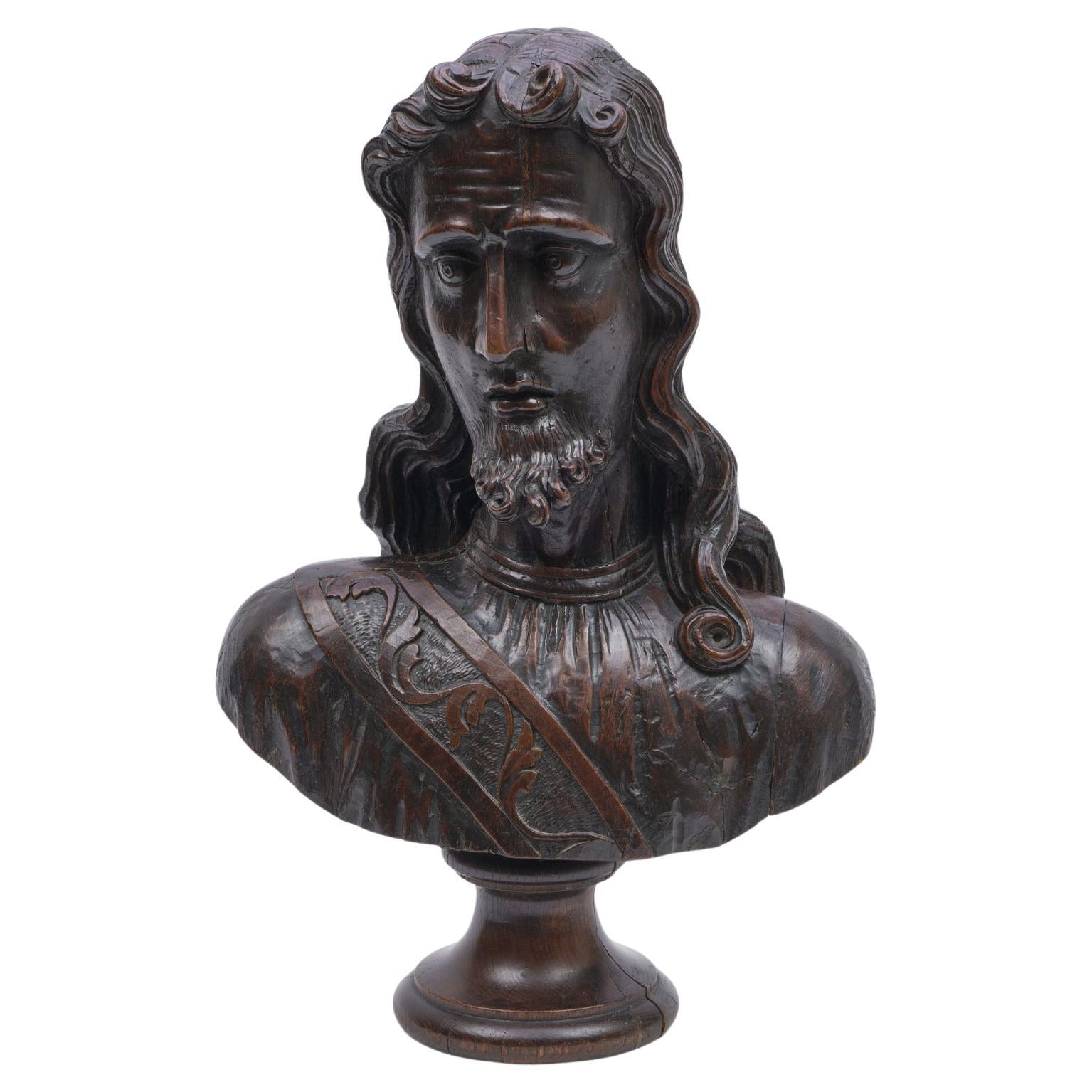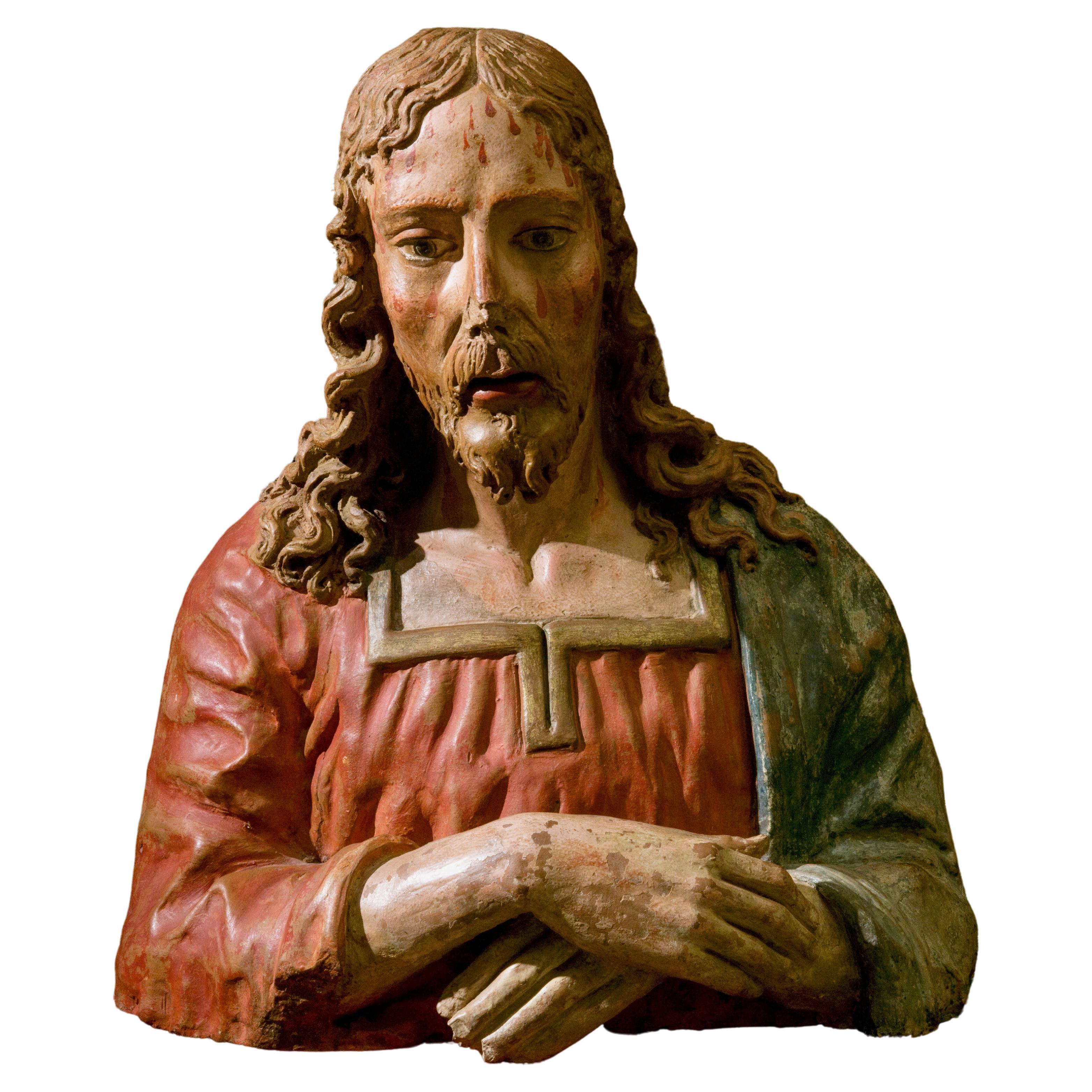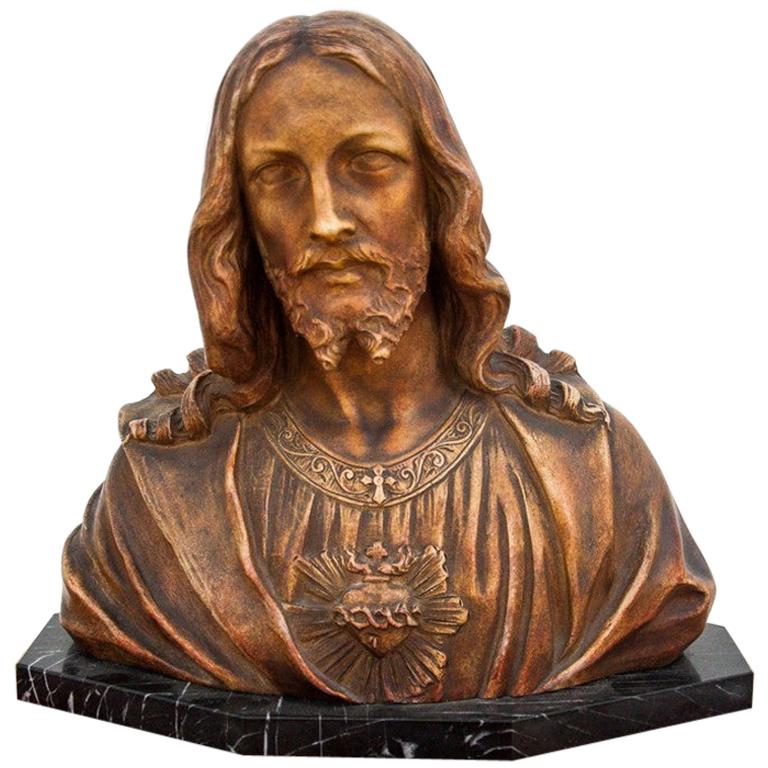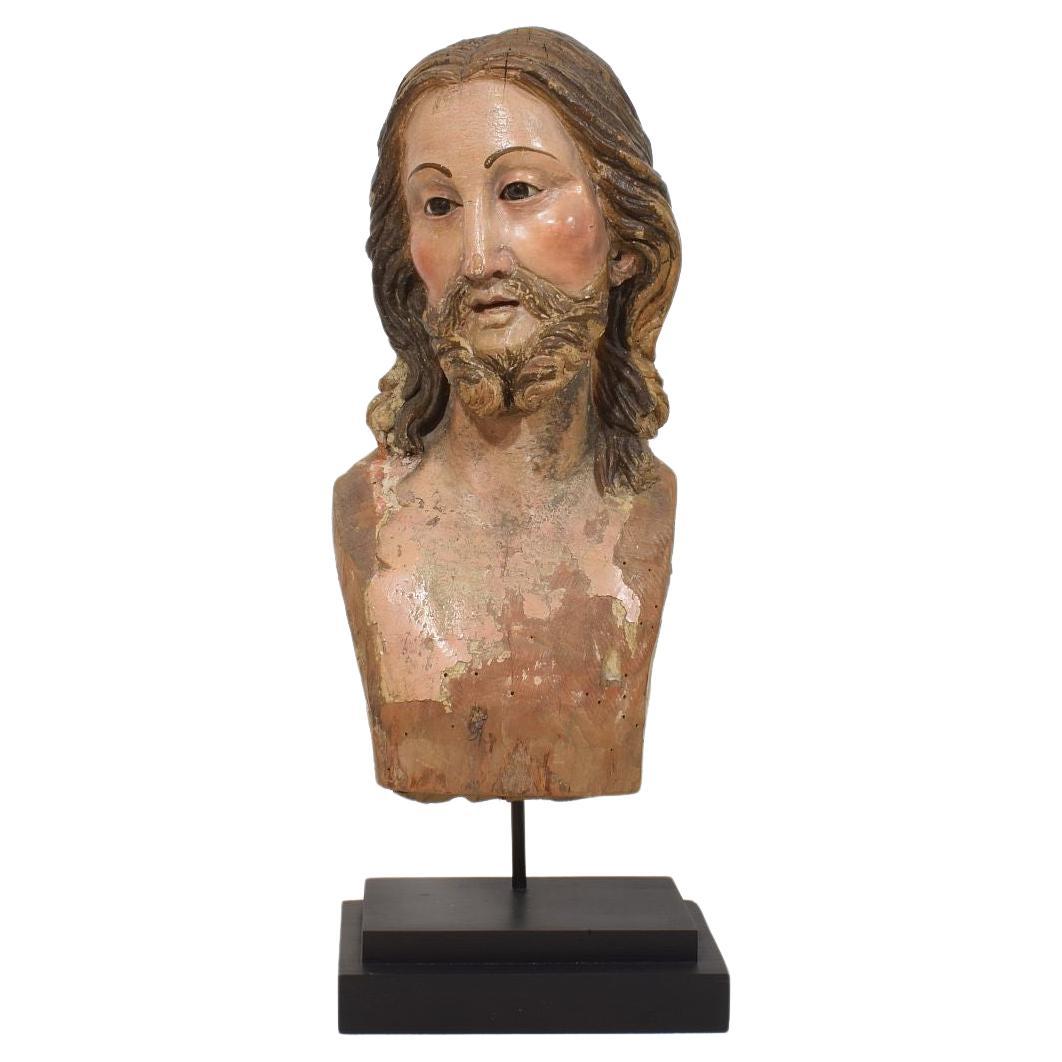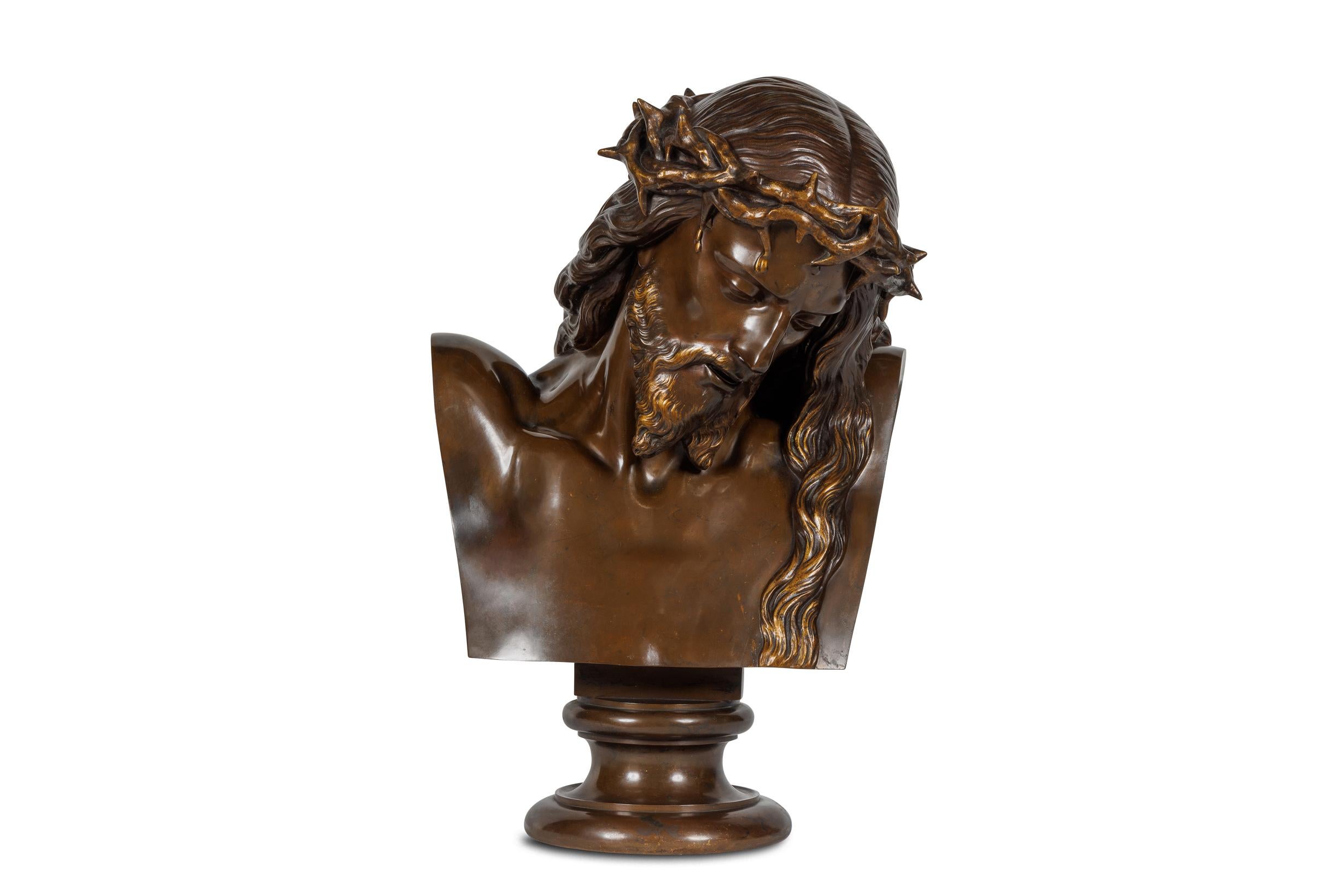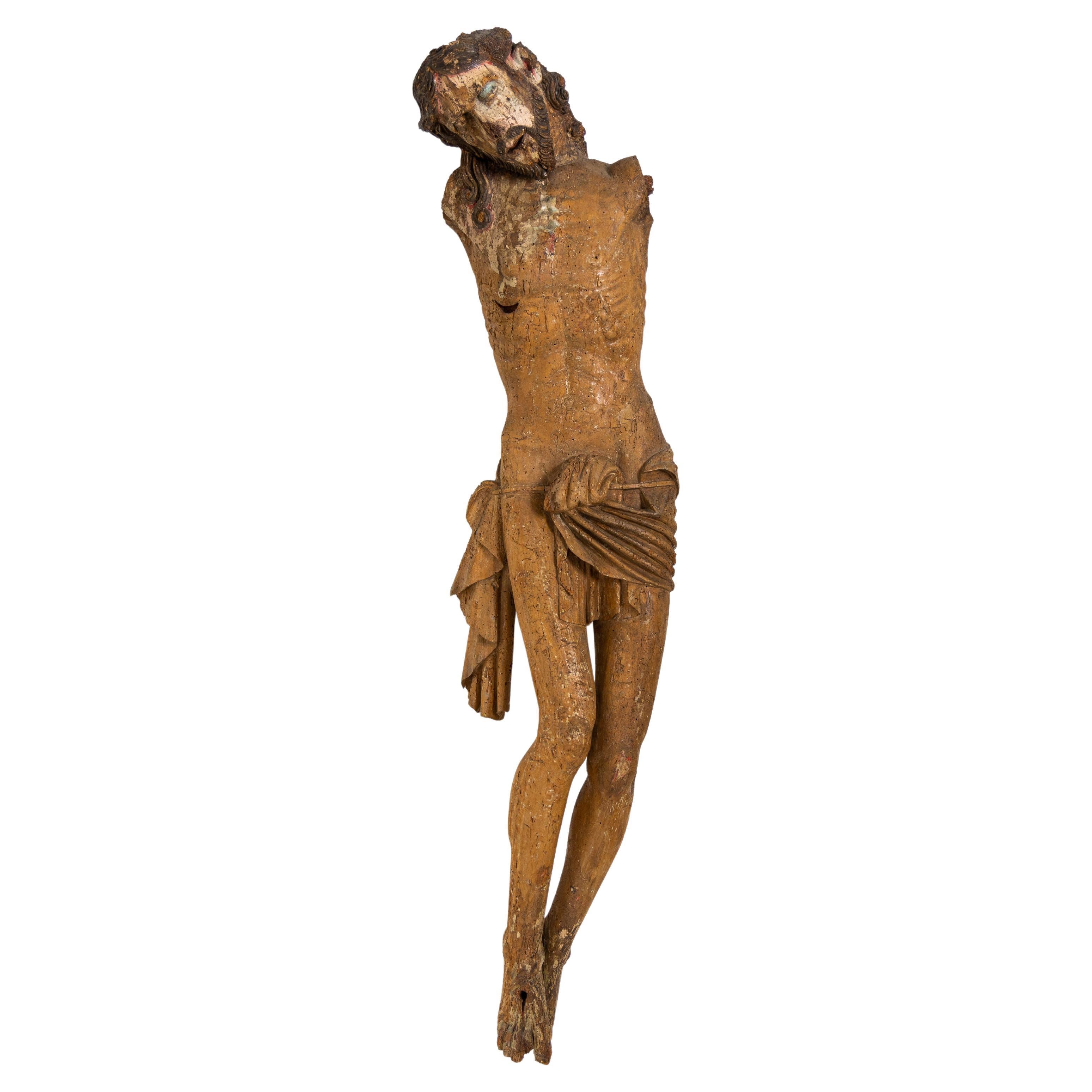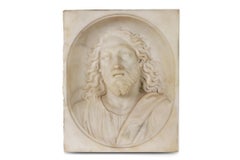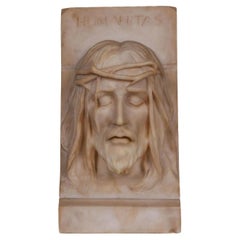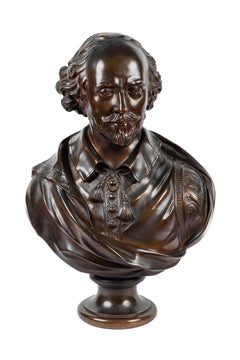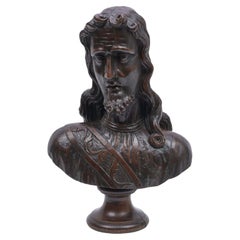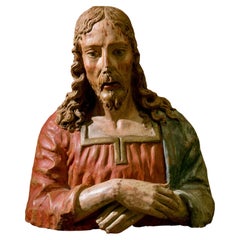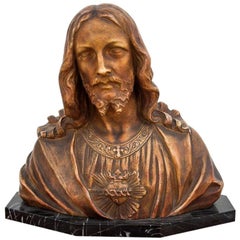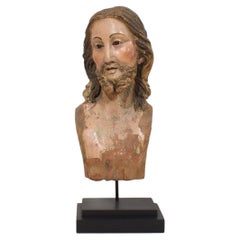Items Similar to A Monumental 16th Century Renaissance Carved Oak Bust of Jesus Christ
Want more images or videos?
Request additional images or videos from the seller
1 of 12
UnknownA Monumental 16th Century Renaissance Carved Oak Bust of Jesus ChristC. 1550
C. 1550
$38,000
£29,232.13
€33,930.19
CA$53,589.07
A$60,028.77
CHF 31,529.28
MX$729,930.61
NOK 399,263.66
SEK 379,008.57
DKK 253,234.16
About the Item
Magnificent and Monumental 16th Century Renaissance Carved Oak Bust of Christ, Flemish Netherlandish, C. 1550
A powerful and deeply expressive Renaissance carved oak bust of Jesus Christ, dating to the 16th century, of impressive scale and masterful execution. Carved from rich Northern European oak, the bust presents Christ with a solemn, contemplative gaze, his elongated features, flowing hair, and finely detailed beard evoking both spiritual authority and profound human emotion.
The sculptor has rendered Christ in a high-relief classical style, with finely incised detailing across the garment, featuring scrolling foliate motifs and a boldly defined sash — stylistic elements consistent with late Gothic transitioning into Northern Renaissance wood carving traditions. The overall composition, especially the strong facial structure, furrowed brow, and naturalistic hair treatment, exemplifies the devotional intensity and anatomical sophistication characteristic of religious sculpture of this period.
Raised on a turned and stepped circular plinth, the bust retains a striking presence and rich patina, with age-related surface wear and minor splits that attest to its genuine antiquity and centuries of veneration.
This is a rare and museum-worthy devotional object, likely once part of a larger ecclesiastical setting or private chapel. Ideal for collectors of early Christian art, Renaissance woodwork, Flemish and Netherlandish works of art, or sacred iconography.
A rare opportunity to acquire a truly museum-quality devotional object that combines spiritual power with historical depth.
24" high x 17.5" wide x 9,5" deep
Condition: Excellent for age; stable with expected age-related cracks and surface wear
- Creation Year:C. 1550
- Dimensions:Height: 24 in (60.96 cm)Width: 17.5 in (44.45 cm)Depth: 9.5 in (24.13 cm)
- Medium:
- Period:
- Condition:
- Gallery Location:Queens, NY
- Reference Number:1stDibs: LU1151216617222
About the Seller
5.0
Vetted Professional Seller
Every seller passes strict standards for authenticity and reliability
Established in 1980
1stDibs seller since 2019
14 sales on 1stDibs
Typical response time: 5 hours
- ShippingRetrieving quote...Shipping from: Long Island City, NY
- Return Policy
Authenticity Guarantee
In the unlikely event there’s an issue with an item’s authenticity, contact us within 1 year for a full refund. DetailsMoney-Back Guarantee
If your item is not as described, is damaged in transit, or does not arrive, contact us within 7 days for a full refund. Details24-Hour Cancellation
You have a 24-hour grace period in which to reconsider your purchase, with no questions asked.Vetted Professional Sellers
Our world-class sellers must adhere to strict standards for service and quality, maintaining the integrity of our listings.Price-Match Guarantee
If you find that a seller listed the same item for a lower price elsewhere, we’ll match it.Trusted Global Delivery
Our best-in-class carrier network provides specialized shipping options worldwide, including custom delivery.More From This Seller
View AllA Monumental Patinated Bronze Bust of Jesus Christ by Clesinger and Barbedienne
By Ferdinand Barbedienne
Located in Queens, NY
A Monumental and Truly Exceptional French Patinated Bronze Bust of Jesus Christ, Circa 1858, Signed J. Clesinger, Rome 1858 & F. Barbedienne Fondeur
This monumental and extraordinar...
Category
19th Century Figurative Sculptures
Materials
Bronze
Rare and Important Italian White Marble Bust Sculpture of Jesus Christ, C. 1850
Located in Queens, NY
Rare and Important Italian White Marble Bust Sculpture of Jesus Christ, C. 1850
A truly exceptionally carved marble relief of Holy Jesus Christ. Ver...
Category
19th Century Renaissance Figurative Sculptures
Materials
Marble
Rare and Important Italian Alabaster Bust Sculpture of Jesus Christ, C. 1860
Located in Queens, NY
A rare and important Italian alabaster bust sculpture of Jesus Christ, C. 1860
A modeled bust of Holy Christ wearing a crown of thorns, exceptional...
Category
19th Century Baroque Figurative Sculptures
Materials
Alabaster
A Monumental French Patinated Bronze Bust of William Shakespeare, after Houdon
By F. Barbedienne Foundry
Located in Queens, NY
A Monumental French Patinated Bronze Bust of William Shakespeare, after Houdon, by F. Barbedienne Foundry, circa 1870.
Masterfully and realistically sculpted in solid bronze, this b...
Category
19th Century Figurative Sculptures
Materials
Bronze
A Monumental Gilt-Lacquered Bronze Ornamental Sculpture of Vajravidarana
Located in Queens, NY
A Monumental Gilt-Lacquered Bronze Ornamental Buddha Sculpture of Vajravidarana:
A Masterpiece of Sino-Tibetan Craftsmanship, Late 19th Century, Qing Dynasty
This monumental gilt-lacquered bronze ornamental sculpture of Vajravidarana is an extraordinary and commanding piece of art, showcasing the pinnacle of Sino-Tibetan craftsmanship from the late 19th century. The figure of Vajravidarana, a powerful purification deity in Tibetan Buddhism, is meticulously sculpted to embody both spiritual authority and artistic excellence.
Vajravidarana is primarily known for his role in removing spiritual impurities and negativities. Unlike other deities associated with wisdom or compassion, Vajravidarana’s function is centered on purification and healing. He is typically depicted holding a vajra and a bell, symbolizing the cutting away of delusions and the resonance of divine truth. In this striking sculpture, Vajravidarana is shown holding a vishva vajra (the double vajra), a unique and powerful variation of the traditional iconography, which signifies ultimate protection and the dispelling of negative karma.
Vajravidarana: The Supreme Purifier and Protector
Vajravidarana is revered in Tibetan Buddhism as the deity of spiritual purification, called upon to cleanse practitioners of defilements and negative influences. His vajra represents the indestructibility of truth, while his bell signifies the wisdom that resonates through purification rituals. In this sculpture, the presence of the vishva vajra, or double vajra, enhances his association with supreme protection, ensuring the destruction of all spiritual obstacles and afflictions.
The figure’s powerful yet composed expression conveys a sense of unwavering resolve and divine authority. His posture, along with the carefully sculpted details of his robes and ornaments, highlights his function as a guardian against impurity. The inclusion of the vishva vajra rather than the usual single vajra reinforces his role as a supreme protector, capable of dispelling all forms of negativity and restoring balance.
Symbolism of the Mantras and Aureole:
Unlike deities that embody wisdom through duality, Vajravidarana’s iconography is centered on purification and exorcism. The aureole surrounding him is inscribed with sacred purification mantras rather than depictions of a consort. These mantras emphasize his function as a remover of obstacles and impurities, reinforcing his role in Buddhist healing rituals.
The presence of the sacred inscriptions elevates the sculpture’s spiritual significance, making it a focal point for meditation and ritual purification. Practitioners often visualize Vajravidarana radiating purifying light, dissolving afflictions and negative karma. This theme is mirrored in the sculptural repetition of the purification symbols on the aureole, reinforcing the deity’s role as a divine cleanser.
Gilt-Lacquered Bronze: The Artistry of Sino-Tibetan Metalwork:
The craftsmanship of this monumental figure reflects the expertise of late 19th-century Sino-Tibetan metalwork, where traditional Tibetan themes were infused with Chinese artistic sensibilities. Cast in bronze and finished with a rich gilt lacquer, the statue has an otherworldly glow, giving it an ethereal, almost divine presence. The gilding process—applied with exceptional skill—gives the sculpture a striking luminosity that enhances the fine details of the facial features, flowing robes, jewelry, and other elements of the deity’s attire.
The technique employed to create this figure speaks to the high level of craftsmanship that flourished during the late Qing Dynasty and early modern Tibetan art. The ornate details of the robes and the fine texture of the sculpture highlight the exceptional skill of the artisans who brought this work to life. The use of gold and lacquer not only reflects the preciousness of the sculpture but also its spiritual significance as an object meant to inspire reverence and meditation.
An Ornamental Sculpture of Monumental Scale:
Unlike smaller devotional objects, this sculpture is designed as an ornamental masterpiece, intended to make a grand visual and spiritual statement. Its monumental size allows it to dominate any space, offering a commanding presence that is both physically and symbolically impressive. In Buddhist practice, large sculptures of this nature are often placed in temples or meditation halls, where their imposing size and serene presence would encourage contemplation and devotion.
The grand scale of the statue further amplifies the spiritual power it is meant to convey. As a representation of Vajravidarana, it is not only a physical object of beauty but also a conduit for meditation, purification, and enlightenment. The scale of the sculpture also emphasizes the divine stature of the deity, highlighting his importance in the Buddhist tradition as the ultimate force for spiritual cleansing and protection.
Provenance:
Acquired in China in circa 1900
1905 Private Buddhist Temple, Northeast, USA
Private Sale
Solomon Treasure...
Category
19th Century Figurative Sculptures
Materials
Bronze
Margaret Foley (American, 1827-1877) Marble Bust "Head of Prophet Zephaniah"
Located in Queens, NY
Margaret Foley (American, 1827-1877) Marble Bust "Head of Prophet Zephaniah"
A rare and important marble bust head relief portrait on The Prophet Ze...
Category
19th Century Figurative Sculptures
Materials
Marble
You May Also Like
A Monumental 16th Century Renaissance Carved Oak Bust of Jesus Christ
Located in Queens, NY
Magnificent and Monumental 16th Century Renaissance Carved Oak Bust of Christ, Flemish Netherlandish, C. 1550
A powerful and deeply expressive Renaissance carved oak bust of Jesus C...
Category
Antique 16th Century Dutch Renaissance Busts
Materials
Oak
Terracotta Bust of Christ as the Redeemer, 15th Century
Located in Bruxelles, BE
A terracotta bust of Christ as The Redeemer
Tuscany or Emilia Romagna, late 15th century
Measures: 46 x 43 x 21 cm
This powerful, moving bust of...
Category
Antique 15th Century and Earlier Italian Renaissance Figurative Sculptures
Materials
Terracotta
Merciful Jesus Bust, Northern Europe
Located in Chorzów, PL
Merciful Jesus Bust, Northern Europe.
Very good condition.
dimensions: height 32 cm, width 36 cm, depth 16 cm.
Category
Vintage 1940s Belgian Other Busts
Materials
Terracotta
$605 Sale Price
20% Off
Large 18th Century Italian / Neapolitan Hand Carved Wooden Head of Christ
Located in Buisson, FR
Unique handcarved wooden head of Christ with beautiful expression and glass eyes, once used at processions.
Napels/ Italy, circa 1750-1800. Beautiful example of 18th century craftsma...
Category
Antique 18th Century Italian Baroque Religious Items
Materials
Gesso, Glass, Wood
$2,971 Sale Price
28% Off
Christ Sculpture, 17th Century
Located in Greding, DE
Almost life-size Christ sculpture of the 17th century. Wood carved and set.
Category
Antique 17th Century Italian Figurative Sculptures
Materials
Wood
Christ the Redeemer. Andrea Ferrucci and workshop (Fiesole c. 1465 - 1526)
By Non-Standard Furniture and Lighting
Located in Milano, IT
Painted stucco sculpture representing the bust of Christ the Redeemer. Dressed in a red tunic embellished with a gold collar, a blue cloak is draped over the left shoulder. The face ...
Category
Antique 18th Century and Earlier Italian Other Busts
Materials
Stucco
